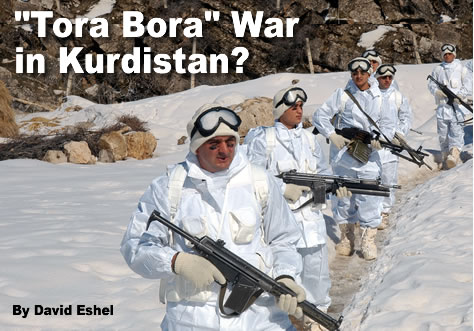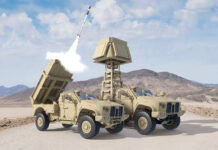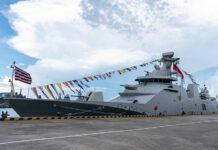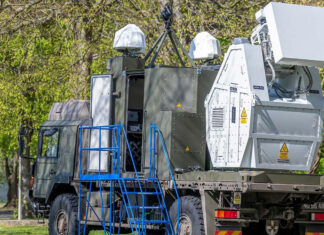As the US War in Iraq seems to diminish into acceptable proportions late 2007, a new crisis is arising in Iraq’s north, as Turkish Armed Forces started a massive land operation against PKK into Kurdistan before. Led by the Turkish Army’s 7th Corps, commanded by General Bekir Kalyoncu, a division sized force, supported by armor and airpower, is rapidly moving into a sofar limited area of some 35-40 kilometers, before entering into the mountain hideouts of the PKK. Alas, the latter will be quite a different ballgame.

Ankara’s move, which has been anticipated for months, is about the last straw, that President Bush can swallow, in his already strained relations with the newly elected Turkish administration. A highly sensitive issue was barely forfended last October, over the controversial Armenian issue, which brought Ankara and Washington onto a dangerous brinkmanship situation.
The Turkish incursion is quite embarrassing to Washington, which has tried hard to avert such action, as Kurdistan remained the only peaceful region in wartime Iraq. Moreover, the US military, in its effort to pacify Ankara, submitted precision intelligence on PKK locations, through aerial photography and satellite imagery, so that any Turkish action would be limited in sporadic point-target operations, but preventing large-scale offensive operations. Now, with the damage already done, the US and the Iraqi central government are most eager to play down the extent of the invasion or at least, keep it within its proportions. However Kurdish leaders, which are aware of Ankara’s hidden strategic agenda for years, are convinced that the aim of the present Turkish attack is to undermine the Kurdish region, which enjoys autonomous rights close to statehood. Ankara has always regarded the semi-independence of Iraqi Kurdistan and the Kurdish claim to the oil city of Kirkuk, as providing a dangerous example for Turkey’s own Kurds, who are equally yearning for some kind of autonomy.

But for the US forces in Iraq, the logistical situation could become disastrous. About 70 percent of the air cargo that reaches the U.S. Army in Iraq originates in Turkey, as does about 30 percent of the fuel used by the army. If the border crossing is closed, or the Kurdish area becomes a war zone, the logistical supply line could be disrupted. Moreover, the Kurds are liable to decide to remove their thousands of top trained Peshmerga soldiers serving alongside US and government troops in the Baghdad region, to fight against the Turks, significantly undermining the ability of the American forces in Baghdad and its surroundings to confront the challenges still awaiting them. A destabilizing situation in Iraq’s north would also become a nightmare to US military planners, now that “post surge” conditions further south seem to be improving substantially.
 To place the situation in geo-demographic perspective: about 30 million Kurds live in the mountainous regions of Iran, Iraq, Syria and Turkey, making them the Middle East’s largest ethnic group without a state. Of these, some 15 million Kurds living in southeastern Turkey have warned that a prolonged Turkish incursion into Iraq would exacerbate tensions with the Ankara government.
To place the situation in geo-demographic perspective: about 30 million Kurds live in the mountainous regions of Iran, Iraq, Syria and Turkey, making them the Middle East’s largest ethnic group without a state. Of these, some 15 million Kurds living in southeastern Turkey have warned that a prolonged Turkish incursion into Iraq would exacerbate tensions with the Ankara government.
In fact, the Turks may be biting off more that they can chew in its new Kurdistan adventure. The Turkish army alone is unlikely to do much damage to the PKK, which has several thousand fighters hidden in a mountainous area that has few roads, currently covered with snow drifts, making tracks virtually impassable.
Even further east, the mountainous region, where the PKK and an Iranian-Turkish guerrilla group known as PJAK operate, is super-tough terrain, with peaks of more than 11,000 feet. An Islamic terrorist group, allegedly affiliated to Al Qaeda, Ansar Al Islam, used it as a base to attack Iraqi Kurds before the 2003 U.S.-led invasion. When the Kurdish Peshmerga fought Saddam Hussein’s formidable army, even the Iraqi government never had firm control over this difficult region, says a veteran Kurdish guerilla leader. “Even Saddam Hussein with chemical weapons couldn’t get people out of that area”, General ‘Mam’ Rostum, a commander of the government loyal Iraqi-Kurdish militia, the Peshmerga, agrees. His own fabled fighters could not dislodge the PKK, he says, “because of the topography, and the PKK is fighting with guerrilla-warfare tactics.” Moreover, the main bases of the PKK are along Iraq’s border with Iran, notably in the rugged Qandil mountains to the south of where the Turkish troops are currently operating. This massive mountain range, between 120 and 150 km (75 and 90 miles) north of the regional capital Arbil, stretches from the tip of southeastern Turkey along the border with Iran.
It is an area described by Iraqis as a natural fortress with its tall peaks, deep valleys and forests that make the perfect terrain for guerrilla warfare. It is here that the Turks could expect stubborn resistance from the Peshmerga, the army of Iraqi Kurdistan with decades of experience fighting a guerrilla war against Saddam.
Turkish leaders in Ankara should remember another war, which was fought under similar conditions. On Christmas 1979, Russian elite paratroopers landed in Kabul, the capital of Afghanistan. The country was already in the grip of a civil war. The prime minister Hazifullah Amin, tried to sweep aside Muslim tradition within the nation and he wanted a more western slant to Afghanistan. This outraged the majority of those in Afghanistan as a strong tradition of Muslim belief was common in the country. Thousands of Afghanistan Muslims joined the Mujahideen – a guerilla force on a holy mission for Allah. The Mujahideen proved to be a formidable opponent. They were equipped with old rifles but had knowledge of the mountains around Kabul and the weather conditions that would be encountered there. The Russians resorted to using napalm, poison gas and helicopter gun ships against the Mujahedeen – but they experienced exactly the same military scenario the Americans had done in Vietnam. Nearly a decade later, the proud Soviet Army was forced to retreat shamefully, a move which put the end of seventy years of the grand Soviet empire. Is Ankara really so keen to enter into a similar high risk adventure?
The answer may be in an equally risky fighting “entente” with Iran. Indeed, another front may open soon towards the east, as fighting could start by Iran against its own Kurdish rebels. The Kurds have manifested an independent spirit throughout modern Iranian history, rebelling against central government efforts to restrict their autonomy during the Safavid, Qajar, and Pahlavi periods. Another Kurdish uprising took place in 1979, following the Revolution at Mahabad, which became the center of Kurdish resistance. But Ayathollah Khomeini had already warned key Kurdish leaders that any attempts at dismantling Iran would be met with the harshest response, and he sent elite counter-insurgency units to the north. As result, fighting raged with the Iranian military battling Kurdish peshmerga forces from the Free Life Party in the Sardasht region of eastern Iran. Kurdish forces managed to defeat forces of the Tehran regime and even captured a military barracks of the Revolutionary Guards in the village of Mazra! Furious over its setbacks, the Guards used attack helicopters against crowds of demonstrators in the Iranian Kurdish town of Saqqez, killing 13 demonstrators and wounding more than 200. But the fighting did not stop. Last August, An Iraqi Kurdish group shot down a IRGC chopper killing eleven members of its crew. As result, Iranian forces were deployed near the Iraqi town of Haj Omran. Iranian and Turkish artillery shelled suspected guerilla outposts inside Kurdistan and further cross-border operations were conducted, coordinated between Turkish and Iranian military commanders.
Veteran journalist and Iran expert, Ken Timmerman was at the front in Northern Iraq, in the Qandil Mountains, last October reporting on how Kurdish insurgents of the PJAK were bringing the fight inside Iran. Timmerman had uncovered a veritable alliance between Turkey, a NATO member and alleged U.S. ally and the Revolutionary Guards of Iran to try and destroy the Kurdish insurgency against the Islamic republic.
The risk, Middle East analysts warn, is that Turkey might become drawn into a wider conflict with Iraqi Kurds even if it initially sought to conduct a small-scale operation, and that other countries, including Iran, which has a long anti-Kurdish tradition, might also feel emboldened by Turkey’s move, if initially successful. American intelligence experts warn, that a major Turkish military offensive, coordinated with Iran, could open a Pandora’s box for the Iraqi fiasco turning it into a regional quagmire, with other countries, such as for example Saudi Arabia, or even Syria, starting to fight inter-ethnic wars on Iraqi territory.

















